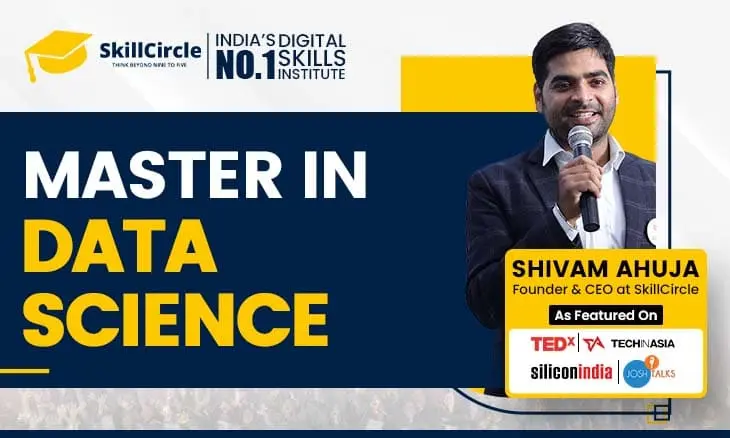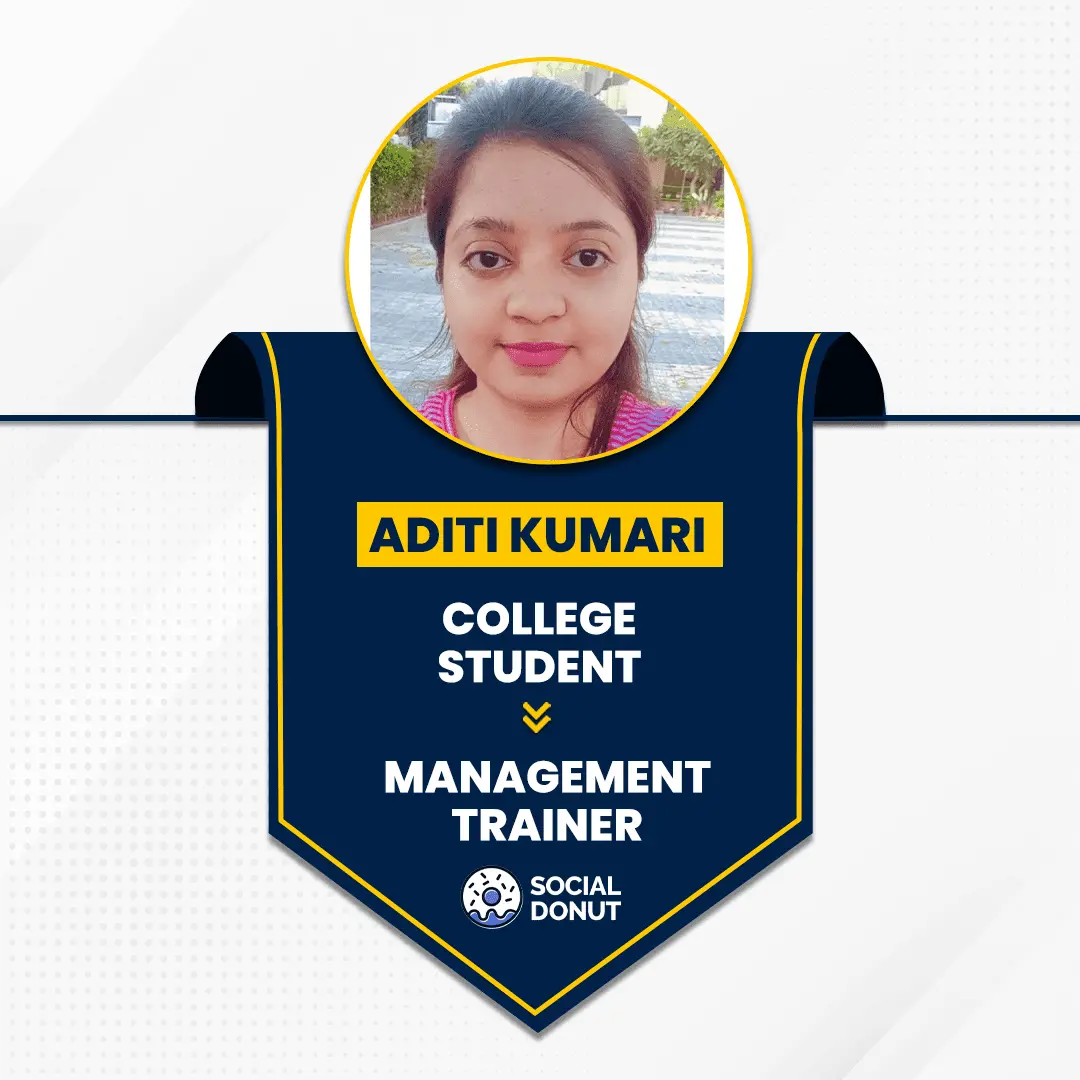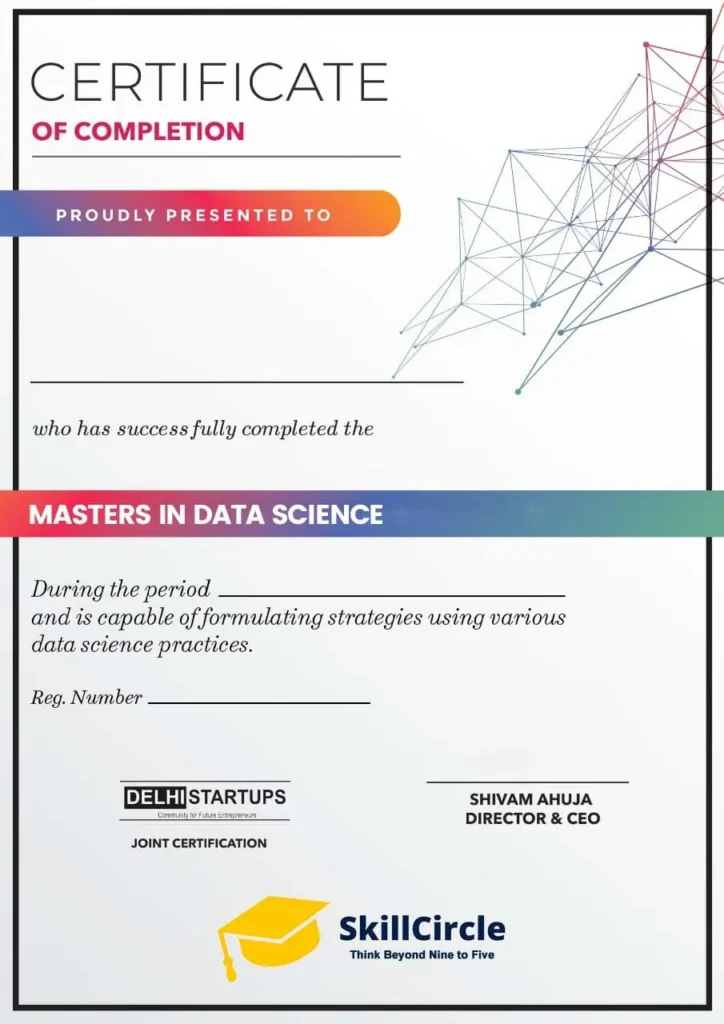Masters Course in Data Science
- More Than 10k+ Students
- 80% Students Placed
- 5.9 LPA Average CTC
- 10 LPA Highest CTC
- 100+ Expert Mentors
- 8 Years in Industry
- 50+ Hiring Parteners
- Hybrid Classes
- 100% Job Placement
- 4.7 Rating on Google

Course Description
Our masters course in Data Science offers a 6-month course with 10 Data-analytics capstone projects to make sure you learn practically during your course. This course will help you gain the latest industry-specific skills, knowledge, and practical experience to excel your presence in today’s competitive world.
Along with the learning and globally recognised certifications, we’ve also got you covered with placements. We at SkillCircle assure every student to get their dream job in the field of Data-Science.
When you choose Skill Circle, you benefit from experienced instructors offering practical insights and real-world applications. Utilize your abilities in practical assignments to develop a strong portfolio that demonstrates your ability. Both full-time professionals and students can benefit from our flexible learning choices.
Program Key Features
- 6 Months of Live Advance Learning.
- Advanced Stimulation Training with Student
- 14+ Modules with Globally Recognised Certification
- 10+ Capstone Projects with Dedicated Mentors from Industry
- Interview Preparation Sessions by HR working at naukri.com
- 100% Placement Assistance at our inHouse #Jobcircle Portal
What You’ll Learn From This Course?
- Trending tools and techniques of Data-science in Business landscape
- Mastering the game of data to get the required business needs fulfilled.
- Develop and execute strategies according to business requirements
- Expertise in areas like, Machine Learning, My SQL, Logistic Regression, and a lot more.
- Advanced skills like, NLP, Deep Learning, KNN, and SVM.
Why you should learn Data Analytics?
If you’re someone who’s looking forward to ruling the industry with your advanced skills in Data Science, then what are you waiting for?
Get started with our masters course in Data Science to make you stand out of the crowd in the industry.
Data Science offers a great flexibility, creativity, and global demand with continuous growth and learning. It will serve you as a valuable investment for your professional growth as well as your personal development.
Still got questions to ask? Get in touch with our experts.
Program Curriculum
- Data Science vs. Data Analytics
- The data science workflow
- Tools and environments (Python, Jupyter)
- Concepts of Regression and Classification
- Data sources and collection
- Data cleaning and preprocessing
- Handling missing data
Regression
- What is regression analysis?
- Types of regression (linear, multiple, polynomial, etc.)
- Use cases and applications of regression in data science
- Simple linear regression
- Multiple linear regression
- Assumptions of linear regression
- Model interpretation and coefficients
- Model evaluation metrics (A-squared, MSE, MAE)
- Introduction to logistic regression
- Logistic regression vs. linear regression
- Binary and multinomial logistic regression
- Odds ratio and log-odds interpretation
- Model evaluation for classification
ASSESSMENT FOR LINEAR AND LOGISTIC REGRESSION
MACHINE LEARNING FUNDAMENTALS
- Understanding machine learning
- Types of machine learning (supervised, unsupervised, reinforcement)
- Machine learning workflow
- Data cleaning and transformation
- Data scaling and normalization
- Handling missing data
- Cross-validation and train-test split
- Evaluation metrics (accuracy, precision, recall, F1-score)
- Bias-variance trade-off
Decision Tree
- What is a decision tree? and How decision trees work.
- Decision Tree Splitting Criteria
- Dealing with categorical features.
- Advantages and Disadvantages of Using a Decision tree Algorithm.
- What is a Random Forest?
- The concept of bagging and boosting
- Random Forest Features and Hyperparameters
- Handling Imbalanced Data
- Feature Importance and lnterpretability
- Introduction to Gradient Boosting
- Understanding boosting and the concept of weak learners.
- How XGBoost improves upon traditional gradient boosting.
- XGBoost Hyperparameters.
- Introduction to Naive Bayes
- Types of Naive Bayes
- Probability Distributions
- Training and Classification
- Introduction to Support Vector Machines
- Support Vector Classification (SVC)
- Support Vector Machines for Regression (SVR)
- Kernel Trick and Non-Linear SVM
ASSESSMENT FOR EACH ALGORITHM OF MACHINE LEARNING
UNSUPERVISED LEARNING ALGORITHMS K-MEANS ALGORITHM
- Introduction to Clustering
- K-Means Algorithm
- Objective Function and Optimization
- Challenges and Limitations
- Introduction to K-NN
- Distance Metrics
- Hyperparameter K
- Decision Boundary and Majority Voting
ASSESSMENT FOR EACH ALGORITHM OF UNSUPERVISED LEARNING
CAPSTONE PROJECTS FOR MACHINE LEARNING, WHERE DATA ANALYTICS PROBLEMS SOLVING IS MANDATORY. CAPSTONE PROJECTS WILL BE DISTRIBUTED ACCORDINGLY.
- Introduction to Deep Learning and TensorFlow.
- Convolutional Neural Networks (CNNs) with TensorFlow.
- Recurrent Neural Networks (RNNs) and Sequence Models.
- Advanced Deep Learning with TensorFlow and Keras.
- Tokenization
- Stop words removal
- Stemming and Lemmatization
- Text cleaning and normalization
- Tokenization
- Stop words removal
- Stemming and Lemmatization
- Text cleaning and normalization
- Bag of Words (BoW)
- Term Frequency-Inverse Document Frequency (TF-IDF)
- Word embeddings (Word2Vec, GloVe)
- Document-term matrices
- Sentiment analysis techniques
- Binary and multi-class classification
- Building a sentiment analysis model
Capstone Projects

Web & Social Media Analytics

Fraud
Analytics

Finance and Risk Analytics

Color
Detection

Marketing and Retail Analytics

Gender and Age Detection

Supply Chain
Analytics

Email Spam
Detection
Tools You Will Learn

















Hiring Partners























Learning Outcomes
There are many fields will be open after doing successfully Data Analytics Course Student can become….

Data Engineer

Data Scientist

Data Architect

Data Administrator

ML Engineer

Business Analytics

AI Engineer

Data Analytics
Meet Your Mentors
We have more than 100+ mentors.
Amit Gupta
VP Amar Ujala

Pranav Jha
Founder : AP Web World

Nishkarsh Sharma
Dropshipping Expert

Parul Mehta Bhargava
Founder: vCommission

Girish Singh
Uber: Head of Marketing

Amit Chawla
Business Clarity Coach

Success Journey











